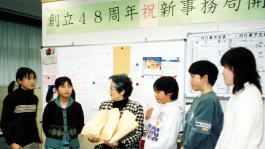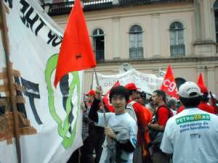195-5
" Miswritten Postcards Arrive"
|
On the afternoon Friday, February 14
th, people in Fudo Elementary School, Ms. Ugamura, and four 5
th and 6
th grades students came to the administration office with miswritten postcards.

Mr. Nishimura, Ms Tachikawa, Mr. Sherlock, and Ms. Masuda listened to the
story of UNESCO from Mrs. Kato, the president of Meguro UNESCO Association
and watched the videotape of "Living together in Bangladesh".
They learned how those postcards are useful, about the lives of people
who cannot attend to the school and the pleasure of having hope and dreams
in each person after learning of letters from those who benefited from
Terakoya Project.
During the presentation ceremony, they said, "We made an appeal
and gathered postcards over three days", and handed three envelopes
filled with miswritten postcards to Mrs. Kato. Ms Ugamura said, "You
may travel abroad to many countries in the future. It would be good to visit developing
countries and other cultures as well as visiting America or England.
While seeing goods from foreign countries, they found a snakeskin from Mr Basheer, the ambassador of the Sudan. All watched carefully as it was unrolled and were surprised how
long it was.
It was short but enjoyable time getting to know the heart of UNESCO through
the Terakoya Movement.
We appreciated the support of UNESCO World Terakoya Movement of Fudo Elementary
School students from the bottom of our heart.
Good luck for the children's future. Shizue
Suzuki, Secretariat
Report on World Education Forum and World Social Forum
|
Yoshihiro NAKANO (PhD Student, CDE centre, University of Sussex, Youth
Member)
 19th to 28th January------World Education Forum (WEF) and World Social Forum (WSF)
took place in Porto Alegre, Brazil. Those Forums aim at posing the question
on the neoliberal globalisation conducted by the International Financial
Institutions such as the World Bank and the IMF as well as the multinational
corporations from the US, Japan, and other advanced industrial countries
since late 1970s. The mass of people, from different places of the world,
Latin America, Europe, Africa and Asia, gathered at the Participatory Democratic
city, Porto Alegre; demonstrate against such form of globalization; and
collaborate one another to make alternative vision of the world. The slogan
of the Forums is: 'Another World is Possible (Outro Mundo Possivel).
19th to 28th January------World Education Forum (WEF) and World Social Forum (WSF)
took place in Porto Alegre, Brazil. Those Forums aim at posing the question
on the neoliberal globalisation conducted by the International Financial
Institutions such as the World Bank and the IMF as well as the multinational
corporations from the US, Japan, and other advanced industrial countries
since late 1970s. The mass of people, from different places of the world,
Latin America, Europe, Africa and Asia, gathered at the Participatory Democratic
city, Porto Alegre; demonstrate against such form of globalization; and
collaborate one another to make alternative vision of the world. The slogan
of the Forums is: 'Another World is Possible (Outro Mundo Possivel).
WEF focused on the issues on the privatization of education system under
the impact of economic liberalization. It argued that the privatization
would undermine the foundation of social stability through generation,
by reducing the opportunities for primary and social educations. Then,
WSF mobilized more than 100,000 participants, two times more than the previous
year: and performed resistance against neo-liberalism and the growing potentials
of the US military action over Iraq.
Personally, the participation to the Forums cultivated the further understanding
of globalization with a critical perspective. Globalization only benefits
a few social groups in the developed societies while it plunges mass of
people into the crisis of their life. Furthermore, globalization is a political
matter and many people now engage themselves to change this trend at the
grassroots level. Reflecting those aspects of reality, I have decided to
commit myself to such social and ethical issues as I do my research on
international development further.
PS: One difficult thing was that Latin American people do not speak English
and French well. Hence I had to communicate with people and participants
in Portuguese and Spanish although I haven't practiced them. I talked with
participants, asking dictionaries and managed to come to know their understanding
and feeling on globalization. 'Cultural understanding begins with learning
language': I realized this with a profound experience.